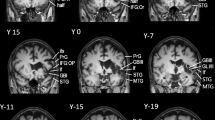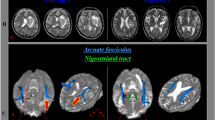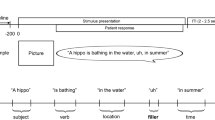Abstract
WHEN brain surgery which may affect language mechanisms is being contemplated, lateralization of speech is sometimes ascertained before operation by injecting 200–250 mg of sodium amobarbital (‘Amytal’) into either right or left common carotid artery, which depresses for several minutes the corresponding cerebral hemisphere1; transient contralateral hemiparalysis and temporary loss of the higher functions dependent on the depressed hemisphere are produced. Although usually used when speech dominance is questionable2–4, amobarbital testing is also indicated in persons with apparently well established laterality when they are to undergo commissural section as a treatment for seizure disorder5. Even where definite right-handedness clearly implies left hemisphere speech dominance, right carotid amobarbital testing can ensure that the preservation of speech does not require right hemisphere participation. This affords an independent approach to the further exploration of the higher functions, for which the right hemisphere may be dominant6. We report here some of the results of right carotid injection in six patients (of P. J. Vogel) who had no previous operative intervention, and had a consistent right-handed preference for a wide variety of tasks including writing, eating and tool use.
This is a preview of subscription content, access via your institution
Access options
Subscribe to this journal
Receive 51 print issues and online access
$199.00 per year
only $3.90 per issue
Buy this article
- Purchase on Springer Link
- Instant access to full article PDF
Prices may be subject to local taxes which are calculated during checkout
Similar content being viewed by others
References
Wada, J., and Rasmussen, T., J. Neurosurg., 17, 266 (1960).
Branch, C., Milner, B., and Rasmussen, T., J. Neurosurg., 21, 399 (1964).
Serafetinides, E. A., Hoare, R. D., and Driver, M. V., Brain, 88, 107 (1965).
Rosadini, G., and Rossi, G. F., Brain, 90, 101 (1967).
Bogen, J. E., Sperry, R. W., and Vogel, P. J., in Basic Mechanisms of the Epilepsies (edit. by Jasper, H. H., Ward, A. A., and Pope, A.) (Little, Brown, Boston, 1969).
Zangwill, O. L., in Scientific Aspects of Neurology (edit. by Garland, H.) (Livingstone, London, 1961).
Milner, B., in Interhemispheric Relations and Cerebral Dominance (edit. by Mountcastle, V. B.) (Johns Hopkins Press, Baltimore, 1962).
Smith, A., J. Neurol. Neurosurg. Psychiat., 29, 467 (1966).
Bogen, J. E., Bull. Los Ang. Neurol. Soc., 34, 135 (1969).
Shankweiler, D., J. Comp. Physiol. Psychol., 62, 115 (1966).
Kimura, D., Quart. J. Exp. Psychol., 16, 355 (1964).
Gordon, H. W., Cortex (in the press).
Author information
Authors and Affiliations
Rights and permissions
About this article
Cite this article
BOGEN, J., GORDON, H. Musical Tests for Functional Lateralization with Intracarotid Amobarbital. Nature 230, 524–525 (1971). https://doi.org/10.1038/230524a0
Received:
Issue Date:
DOI: https://doi.org/10.1038/230524a0
Comments
By submitting a comment you agree to abide by our Terms and Community Guidelines. If you find something abusive or that does not comply with our terms or guidelines please flag it as inappropriate.



